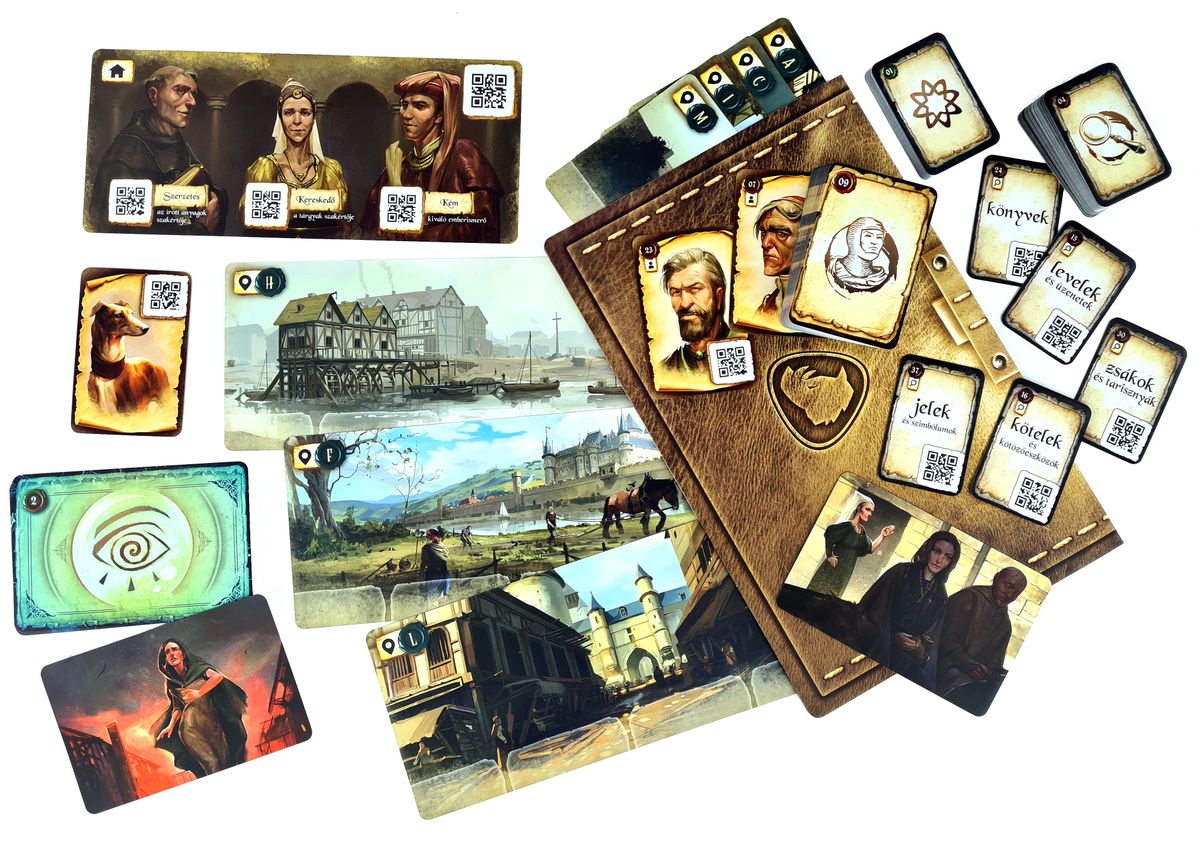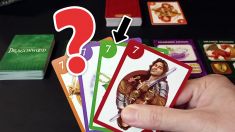Become a Time-Traveling Sleuth in Chronicles of Crime: 1400 and 1900

The popular deduction game from Lucky Duck Games lends its branding to a new series that places players in historical settings.
Gameplay
Both 1400 and 1900 make set up easy and starting a new game simple. Players will place the evidence board as well as a location board (in 1400 this is known as the home location, in 1900 this is the newspaper office) out for all players to easily access. The evidence board will be home to any evidence cards you uncover during the course of the game, with each colored row having specific meanings depending on the story. Stack the character, special items, and special cards (Vision cards for 1400, Puzzle cards for 1900) face-down where everyone can reach them. Set out the double-sided location boards and evidence cards. Finally, download and open the Chronicles of Crime app and select the version of the game you are playing.
The game’s app will handle most of the heavy lifting, including helping with set up. From here on out, technology and each player’s deduction will be the tools necessary to solve the crime. Each version comes with 4 scenarios, and each offers a tutorial that is highly recommended. Players will read the scenario, uncover the instructed character cards (each has a number on the back) and evidence (placing them on the evidence board as instructed by the game) and vision or puzzle cards. Players will then be able to scan the QR codes on these cards and boards to ask the characters questions about other people, items, symbols, locations, and more. As game play unwinds, more characters, locations, visions/puzzles and evidence cards will be discovered.
By scanning certain cards and then scanning another card (for example, scanning a book in available evidence and then scanning a character) new information may be revealed that is helpful to the case. Sometimes, these will result in allowing players to scan a location. This is done using augmented reality within the app, where players will “scan” the room they are in with the app but will see the game’s location. The person scanning the room may call out items and symbols they are noticing. The rest of the players will thumb through the evidence and find any matches that fit the description to set aside. Players will have the option of allowing a second player to also scan to find any missing items the previous player may have missed. Players will then scan the cards, and if prompted, those cards may be placed in the appropriate row on the evidence board.
Each action will cost players amounts of time. Time may affect which characters are at specific locations as well as be integral to the length of each scenario before players are forced to solve the case or face a loss. The less time spent in cracking a case can also yield higher points totals at the end of the game if players solve the case correctly, so being judicious with scanning is recommended.
When players believe they have solved the case, they may travel to the location in the scenario specified and click the Solve the Case button. Players are prompted to answer multiple choice questions by scanning the QR code of the character(s), evidence, and location(s) that answer those questions. Players will receive a score based on how correct they were and the time it took to solve the case.

Chronicles of Crime: 1400 (image provided by the publisher)
Review
These new self-contained spin-offs from the Chronicles of Crime series are fantastic gateways into the original version, but also provide their own unique fun. Set up is quick and easy, as is learning the game thanks to the tutorial scenarios in the app. This allows any group with varying levels of skill to jump in and start sleuthing together with few roadblocks.
The app controls much of the game, so it’s a matter of working with the group to decide what to scan, when to scan, and how often to scan. This means passing a tablet or smartphone back and forth, which can be cumbersome for some groups. In fact, 1400 and 1900 seem to work better with couples or solo gaming due to the app integration. Being a solitary experience highlights what works best about the app and the gameplay more than larger groups. It also prevents quarterbacking from one player looking to rush through the content or people feeling left out because only certain players are privy to information from controlling the device being used.
The game’s timing mechanism can be tricky because scenarios do not lay out the amount of time players have to solve the case before being prompted to solve the case or failing. Failure can be frustrating, because the app will sometimes offer the solution when players are incorrect or only partially correct, which hurts replayability of those scenarios. Thankfully, the scenarios ratchet up the difficulty as players progress, meaning the few scenarios available will not be sped through too quickly. And it’s easy to stop mid-game, put aside the cards that are pivotal to the case to resume at a later time.
These new spin-offs of the Chronicles of Crime series do a good job of embracing the environments and themes of their chosen century. They each have their own little quirks within the gameplay and theming that makes each unique. For example, in 1400 players have a faithful dog companion named Percival who can help sleuths and even lead them to items or locations. While some of these quirks are McGuffins meant to help move the story along, they all add something to the gameplay (and all cannot be revealed to avoid spoiling the games).
Overall, Chronicles of Crime: 1400 and Chronicles of Crime: 1900 are strong continuations of the original game. They provide enough deduction and mystery in a smaller package to bring players of any skill level around the table for a good, fun time. And each game provides its own unique twist on the Chronicles of Crime formula to make them worthy additions to the series.
Pros: Easy to set up and learn, app helps players navigate between cards with ease, historical settings and themes are fun
Cons: Better as a solo/couples game than a group game, app can be clunky and fidgety, some scenarios can run over 60 mins. at max player count









